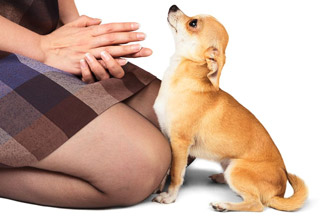Are dogs trying to communicate through facial expressions?
 Imagine that the look of a guilty dog (you know, the one he uses when you scold him) wasn’t just a simple demonstration of emotion, but also represented a desire to communicate? A team of researchers from the University of Portsmouth (United Kingdom) wanted to explore canine facial expressions. Couldn't they be attempts to communicate with humans?
Imagine that the look of a guilty dog (you know, the one he uses when you scold him) wasn’t just a simple demonstration of emotion, but also represented a desire to communicate? A team of researchers from the University of Portsmouth (United Kingdom) wanted to explore canine facial expressions. Couldn't they be attempts to communicate with humans?As the authors remind us in the introduction to their study, “it has long been assumed that animal facial expressions, including some human facial expressions, are involuntary and dependent on an individual's emotional state rather than being flexible responses to the audience.” But research has shown that primates (orangutan, gibbon) can modify their facial expressions in the presence of an audience (they become more intense and/or more complex), suggesting that they're not necessarily automatic, but may be supported by sophisticated cognitive processes. The phenomenon has never been recorded in other species until now. That’s why Julianne Kaminski and her colleagues wanted to test whether the facial expressions of (domestic) dogs were subject to an audience effect and whether they changed when they were in the presence of a very stimulating but non-social presence (food) or a social presence, namely a caring audience.
Obviously, research has already proven that dogs are capable of following the attentional state of a human. For example, even if we’ve told him not to eat the food, Fido is more likely to disobey if we turn our backs or busy ourselves with another task. But no studies have ever shown that dogs' facial expressions could be adapted to a human's attentional state, which according to the authors could suggestion a certain form of social communication and voluntary control. They thus hypothesized that if the dog's facial expressions are only simple emotional displays, no difference should be seen between the non-social (food) and social (human attention) condition.
Anouk, Kendra, Guinness... a total of 24 dogs (13 males, 11 females) of different breeds and ages participated in the study. Prior to beginning the tests, each dog was acquainted with the experimenter and the room. Then, the dog was put on a leash and the experimenter (E) stood in front of him and behaved according to the following four conditions: attentive to the food (E has the food in the palm of their hand and shows it to the dog), attentive without food (E shows their hands without food), non-attentive with food (E turns their back to the dog with their arms behind them and palms open showing the dog the food) and non-attentive without food (E turns their back and shows empty palms). For these four experimental conditions, the dogs’ facial expressions were filmed and analyzed (with the DogFACS tool).
The results show that the dogs produced more facial expressions (especially showing their tongues and raising their eyebrows) when the experimenter was facing them, whether or not food was present. However, seeing the food alone had no effect on the production of facial movements. Even if the absence of physiological measures prevents the authors from confirming it, they believe that seeing the human's eyes may be important to the dog. While this research doesn't definitively prove that dogs modulate their facial expressions according to humans’ attentional states, dogs are clearly prone to audience effects and their expressions combine both emotional and cognitive processes.
Source: J. Kaminski, J. Hynds, P. Morris, B.M. Waller, “Human attention affects facial expressions in domestic dogs”, in Scientific Reports, Oct. 2017







